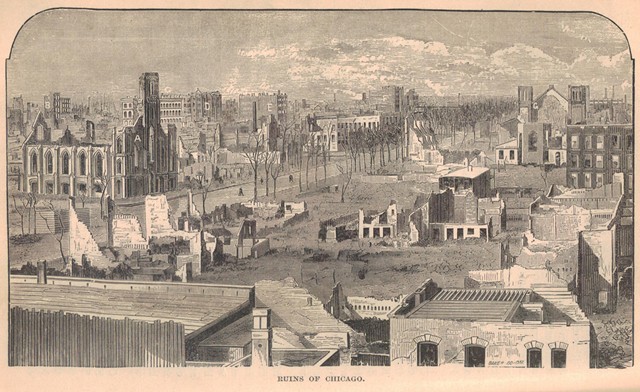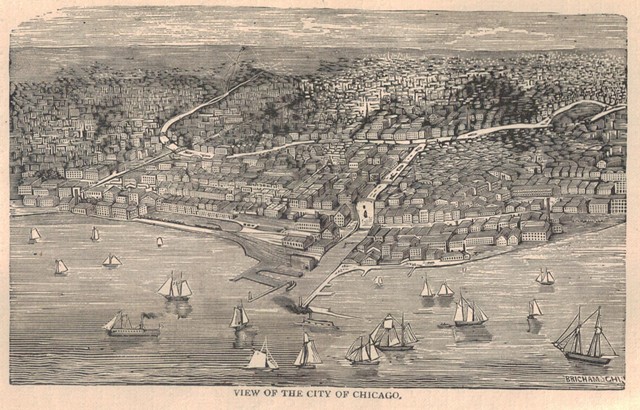Pg 107
The procession moved slowly along the lake shore till they reached the sand-hills between the prairie and the beach, when the Pottawattamie escort, under the leadership of Blackbird, filed to the right, placing those hills between them and the white people. Wells, with his Miamis, had kept in the advance. They suddenly came rushing back, Wells exclaiming, “They are about to attack us; form instantly.” These words were quickly followed by a storm of bullets, which came whistling over the little hills which the treacherous savages had made the covert for their murderous attack. The white troops charged upon the Indians, drove them back to the prairie, and then the battle was waged between fifty-four soldiers, twelve civilians and three or four women (the cowardly Miamis having fled at the outset) against five hundred Indian warriors. The white people, hopeless, resolved to sell their lives as dearly as possible. Ensign Ronan wielded his weapon vigorously, even after falling upon his knees weak from the loss of blood. Capt. Wells, who was by the side of his niece, Mrs. Heald, when the conflict began, behaved with the greatest coolness and courage. He said to her, “We have not the slightest chance for life. We must part to meet no more in this world. God bless you.” And then he dashed forward. Seeing a young warrior, painted like a demon, climb into a wagon in which were twelve children, and tomahawk them all, he cried out, unmindful of his personal danger, “If that is your game, butchering women and children, I will kill too.” He spurred his horse towards the Indian camp, where they had left their squaws and papooses, hotly pursued by swift-footed young warriors, who sent bullets whistling after him. One of these killed his horse and wounded him severely in the leg. With a yell the young braves rushed to make him their prisoner and reserve him for torture. He resolved not to be made a captive, and by the use of the most provoking epithets tried to induce them to kill him instantly. He called a fiery young chief a squaw, when the enraged warrior killed Wells instantly with his tomahawk, jumped upon his body, cut out his heart, and ate a portion of the warm morsel with savage delight!
In this fearful combat women bore a conspicuous part. Mrs. Heald was an excellent equestrian and an expert in the use of the rifle. She fought the savages bravely, receiving several severe wounds. Though faint from the loss of blood, she managed to keep her saddle. A savage raised his tomahawk to kill her, when she looked him full in the face, and with a sweet smile and in a gentle voice said, in his own language, “Surely you will not kill a squaw!” The arm of the savage fell, and the life of the heroic woman was saved.
Mrs. Helm, the step-daughter of Mr. Kinzie, had an encounter with a stout Indian, who attempted to tomahawk her. Springing to one side, she received the glancing blow on her shoulder, and at the same instant . . .
Pg 108
. . . seized the savage round the neck with her arms and endeavored to get hold of his scalping knife, which hung in a sheath at his breast. While she was thus struggling she was dragged from her antagonist by another powerful Indian, who bore her, in spite of her struggles, to the margin of the lake and plunged her in. To her astonishment she was held by him so that she would not drown, and she soon perceived that she was in the hands of the friendly Black Partridge, who had saved her life.
The wife of Sergeant Holt, a large and powerful woman, behaved as bravely as an Amazon. She rode a fine, high-spirited horse, which the Indians coveted, and several of them attacked her with the butts of their guns, for the purpose of dismounting her; but she used the sword which she had snatched from her disabled husband so skillfully that she foiled them; and suddenly wheeling her horse, she dashed over the prairie, followed by the savages shouting, “The brave woman! the brave woman! Don’t hurt her!” They finally overtook her, and while she was fighting them in front, a powerful savage came up behind her, seized her by the neck and dragged her to the ground. Horse and woman were made captives. Mrs. Holt was a long time a captive among the Indians, but was afterwards ransomed.
In this sharp conflict two-thirds of the white people were slain and wounded, and all their horses, baggage and provision were lost. Only twenty-eight straggling men now remained to fight five hundred Indians rendered furious by the sight of blood. They succeeded in breaking through the ranks of the murderers and gaining a slight eminence on the prairie near the Oak Woods. The Indians did not pursue, but gathered on their flanks, while the chiefs held a consultation on the sand-hills, and showed signs of willingness to parley. It would have been madness on the part of the whites to renew the fight; and so Capt. Heald went forward and met Blackbird on the open prairie, where terms of a surrender were soon agreed upon. It was arranged that the white people should give up their arms to Blackbird, and that the survivors should become prisoners of war, to be exchanged for ransoms as soon as practicable. With this understanding captives and captors started for the Indian camp near the fort, to which Mrs. Helm had been taken bleeding and suffering by Black Partridge, and had met her step-father and learned that her husband was safe.
A new scene of horror was now opened at the Indian camp. The wounded, not being included in the terms of surrender, as it was interpreted by the Indians, and the British general, Proctor, having offered a liberal bounty for American scalps, delivered at Malden, nearly all the wounded men were killed and scalped, and the price of the trophies was afterwards paid by the British government.





